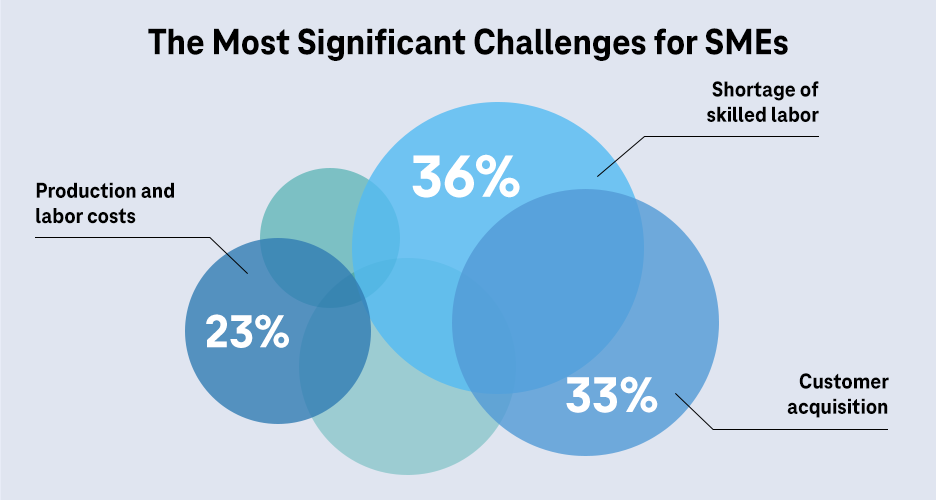Analysis and onboarding
In this article, you will learn
- why cloud solutions are becoming more important for SMEs,
- what defines a secure cloud for SMEs and
- which certifications businesses should look for.

In this article, you will learn
A growing shortage of skilled labor, the need for innovation, and the drive to remain internationally competitive are three key reasons digitalization remains a top priority. SMEs must continue to expand their digital efforts. But what role do cloud solutions play in this process – and which type of cloud is best suited to meet their needs?
While DAX-listed companies often dominate the headlines, it is Germany’s 3.5 million small and medium-sized enterprises (SMEs) that truly drive the economy. SMEs account for over 99% of all businesses and nearly 97% of exporters, contributing approximately €230 billion in exports.
Two recent studies provide insight into the current situation. The SME Barometer from the Institure for SME Research in Bonn (May 2025), based on ECB data (SAFE survey), shows that the biggest concern for SMEs is the ongoing shortage of skilled workers (36%), followed by customer acquisition (33%) and rising production and labor costs (23%).

The KfW SME Panel’s special survey from January 2025 highlights five key challenges: excessive bureaucracy, the shortage of skilled labor, rising costs, hesitant consumer behavior, and political uncertainty. Concerns about Germany’s overall competitiveness are growing. KfW notes: “Germany’s competitiveness and productivity depend heavily on innovation. Our formerly strong innovation ecosystem is losing ground internationally – especially in developing new technologies like digitalization.”
So what can companies do to remain successful? According to KfW, digitalization is the key to future success:
[...] Across the economy, innovation and digitalization must be advanced. Without progress in these areas, measurable improvements in productivity and growth won’t be possible, and Germany’s ability to renew itself will suffer significantly [...] That’s why digital technologies must be adopted by businesses and integrated into their products and services.
– KfW Research position paper, March 12, 2025
Many leading SMEs have already recognized the importance of digitalization. They are enhancing their products with digital services. For example, ebm-papst, a global leader in fan and ventilation technology, uses data analytics to optimize cooling performance based on actual demand. Packaging machinery manufacturer Optima views AI-driven services as a key innovation driver, leveraging generative AI to make machine information accessible via natural language. These value-added services help maintain their competitive edge in global markets.
For independent software vendors (ISVs) like d.velop AG, a leading provider of content services applications in the German-speaking market, digitalization has meant rethinking their business model. “We realized early on that our future lies not in the on-premises world, but in SaaS – Software as a Service,” says Nico Bäumer, CTO of d.velop. “Our goal was to offer our software in a simple, scalable, and secure cloud environment.”
Whether in traditional mechanical engineering or among independent software vendors (ISVs), all digital developments share one thing in common: digitalization needs an engine. With the rise of AI, the demand for scalable, on-demand resources continues to grow. “The benefits of the cloud aren’t always immediately apparent. Simply shifting workloads doesn’t always make economic sense. For many SMEs, finding valid use or business cases is difficult due to a lack of transparency or experience,” explains Heiko Röhr, Head of Cloud Expert Sales at Deutsche Telekom. “But whenever this hurdle is overcome, it becomes clear: the cloud – when used correctly – is the perfect IT delivery model for modern business needs. It’s an all-in-one package that’s incredibly easy to use.”
Users don’t need to invest in additional licenses, and resources are delivered as a fully managed service. Infrastructure management, installation, and maintenance are handled externally – a significant advantage given the current shortage of in-house IT staff and the competitive labor market. Cloud services also allow SMEs to experiment with new services quickly and with minimal risk. Resources that are no longer needed can simply be released, eliminating unnecessary costs. In many cases, the cloud even offers greater IT security than in-house systems – not to mention a smaller carbon footprint.
Is the cloud truly a package full of advantages? A closer look reveals some important considerations. Standard cloud offerings often fall short when it comes to high-quality support. There’s also the ongoing dependence on the provider’s technology – and growing concerns about the uncertainties of today’s (2025) geopolitical landscape. So, what exactly defines a secure cloud for businesses?
The solution to these cloud challenges is a sovereign European cloud like the Open Telekom Cloud. Built on OpenStack, it reduces vendor lock-in and ensures that all data storage and operations remain within Europe – meeting key European data protection standards and enabling users to exercise their legal rights. With support available in both German and English, customers benefit from a dedicated point of contact.
The Open Telekom Cloud offers a secure, certified environment that meets even the most stringent regulatory standards. With extensive certifications and supplementary agreements – including the Financial Addendum, confidentiality obligations under §203 of the German Criminal Code, and protection of social secrets under §35 of the Social Code – it is suitable for professionals such as lawyers, auditors, doctors, health insurers, and banks.
Independent analysts from Forrester and ISG recognize the Open Telekom Cloud as one of Europe’s leading cloud platforms, thanks to its broad service portfolio, AI capabilities, and commitment to sovereignty. According to the ISG Multi Public Cloud Provider Lens 2024: “The Open Telekom Cloud offers a state-of-the-art secure infrastructure tailored to European business customers. Sovereignty, compliance, reliability, and sustainability are core features strictly adhered to. T-Systems guarantees that all data is processed and hosted in European data centers and operated solely by European personnel. Security is evidenced by the BSI C5 certification.”
Extensive certifications confirm a high level of security and regulatory suitability (public, health, KRITIS, finance) – ideal for small businesses as well.
In 2024 alone, over 400 SMEs chose the Open Telekom Cloud – and many have steadily expanded their use since. “There are three key reasons for that,” explains Röhr. “The Open Telekom Cloud is easy to use and understand, provides full cost transparency and long-term price stability, and – as a product from Germany – offers German-language support and high reliability.”
The cloud itself is only the starting point. What sets SME cloud solutions apart is when providers go beyond infrastructure to offer hands-on support. Professional and managed services help bridge gaps in in-house expertise across onboarding, migration, and ongoing operations. T-Systems supports SMEs with a proven methodology to guide them through a successful transition to the cloud.

Analysis and onboarding
In a free initial workshop, our experts assess your current setup and discuss your goals. Based on this evaluation, we create a tailored roadmap for cloud onboarding. Partners from our ecosystem can also be brought in to support the process.

Detailed planning
Together, we identify which workloads should be migrated to the Open Telekom Cloud, select the appropriate resources, and design the technical and management architecture. The roadmap includes security and compliance checks, along with the implementation of necessary safeguards – ensuring a secure cloud environment for your business.

You can build and manage your own Virtual Private Cloud using the console or API. Once resources are provisioned, workloads, applications, and data can be migrated. Your instance also gives you access to a wide range of cloud management tools to streamline daily operations.

Monitoring and support
With the Open Telekom Cloud, many infrastructure services are included. We manage platform security, provide hardened operating systems, and ensure continuous updates. The Financial Dashboard offers effective cost control. Our Customer Success Management team helps you get the most out of your cloud solution – and you’ll have free access to 24/7 support and ongoing training opportunities.
Want to learn more about our support offerings? Looking for secure enterprise cloud storage? Or simply want to explore your cloud options in a no-pressure conversation? Get in touch with us.
The minimum requirements for a secure SME cloud include ISO 27001, 27017, 27018, and BSI C5 Type 2. Always ask for proof of these certifications.
Secure enterprise cloud storage for SMEs means your data should reside in fail-safe European data centers. Ask for specific data center locations and information on data residency measures to remain audit-ready.
That depends on the cloud provider. Patient data is more sensitive than standard personal data. GDPR compliance is essential, but additional healthcare and social data protection requirements may also apply.
Authorities typically require compliance with criteria equivalent to the German IT baseline protection standards (IT-Grundschutz).
Cloud providers operating in KRITIS environments must be registered with the German BSI as KRITIS operators and undergo regular mandatory audits.
Yes. Cloud solutions benefit companies of all sizes and industries. End users can use ready-to-deploy SaaS offerings, while IT teams can work with PaaS (e.g., containers, databases as a service) and IaaS (e.g., GPUs for AI training or application hosting).
Yes, but it requires a comprehensive security framework beyond infrastructure – particularly for data in transit. IoT platforms should also include specific security measures.
Two key requirements are a redundant storage architecture that takes advantage of cost-effective options such as cold object storage, and highly automated backup processes.
Maximum safety for carefree working: The Open Telekom Cloud fully meets the stringent requirements of GDPR.
ISG Provider Lens: Open Telekom Cloud once again leader in the German market
The Open Telekom Cloud stands out once again: In the latest ISG Market Report 2024, it is recognized as a leading European public cloud.
The financial sector on the path to the DORA age
DORA places new demands on IT security in the financial sector. Learn how to successfully build digital resilience.
The Open Telekom Cloud Community
This is where users, developers and product owners meet to help each other, share knowledge and discuss.
Free expert hotline
Our certified cloud experts provide you with personal service free of charge.
0800 3304477 (from Germany)
+800 33044770 (from abroad)
24 hours a day, seven days a week
Write an E-Mail
Our customer service is available free of charge via E-Mail
AIssistant Cloudia
Our AI-powered search helps with your cloud needs.
In order to use our AI-powered seach you must first accept the cookies for services by other companies.